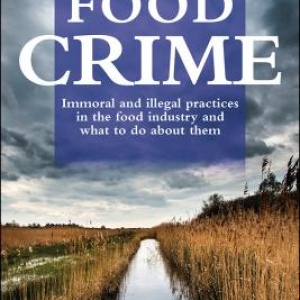
The book “A handbook of food crime: Immoral and illegal practices in the food industry and what to do about them”, edited by Allison Gray and Ronald Hinch, discusses some of the problems in current food systems that lead to food crime. Topics discussed include food adulteration, forced labour in the chocolate industry, animal transportation and regulation of food waste.
Publisher’s summary
Food today is over-corporatized and under-regulated. It is involved in many immoral, harmful, and illegal practices along production, distribution, and consumption systems. These problematic conditions have significant consequences on public health and well-being, nonhuman animals, and the environment, often simultaneously.
In this insightful book, Gray and Hinch explore the phenomenon of food crime. Through discussions of food safety, food fraud, food insecurity, agricultural labour, livestock welfare, genetically modified foods, food sustainability, food waste, food policy, and food democracy, they problematize current food systems and criticize their underlying ideologies.
Bringing together the best contemporary research in this area, they argue for the importance of thinking criminologically about food and propose radical solutions to the realities of unjust food systems.
Reference
Gray, A. and Hinch, R. eds., 2018. A handbook of food crime: Immoral and illegal practices in the food industry and what to do about them. Policy Press, Bristol.
Read more here. See also the Foodsource chapter How are food systems, diets, and health connected?







Post a new comment »